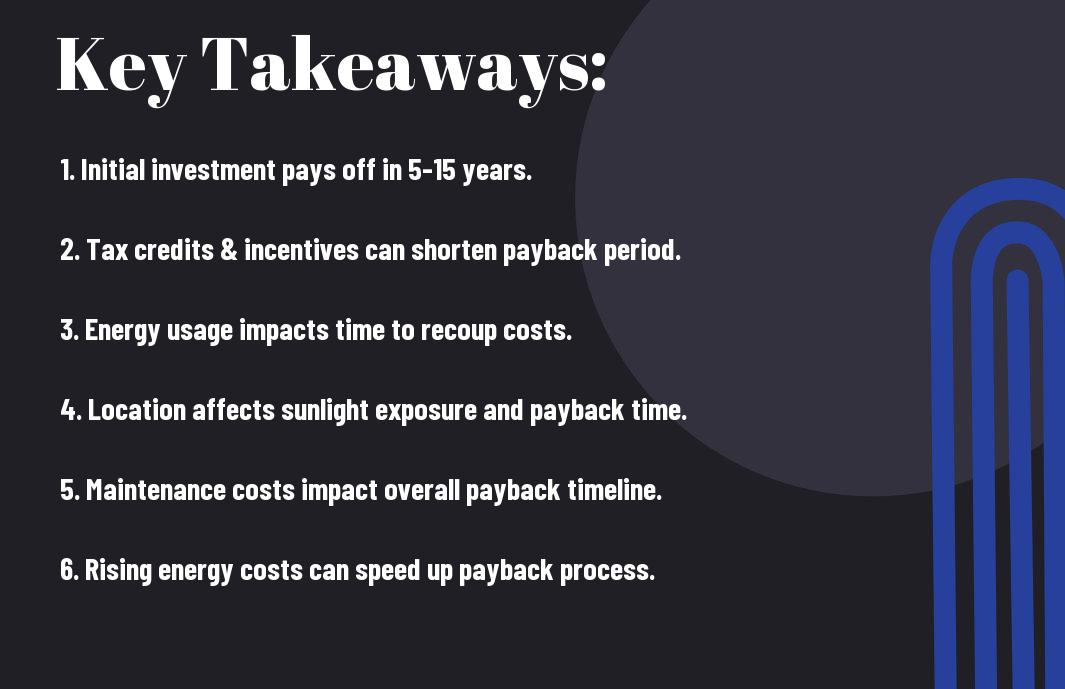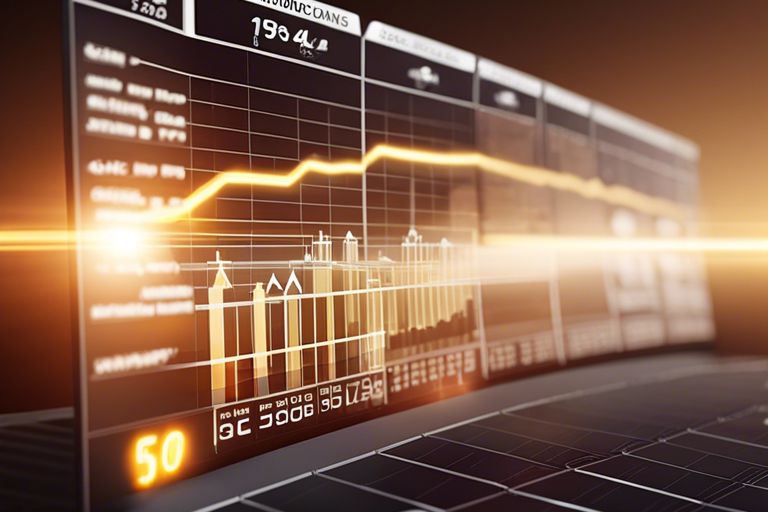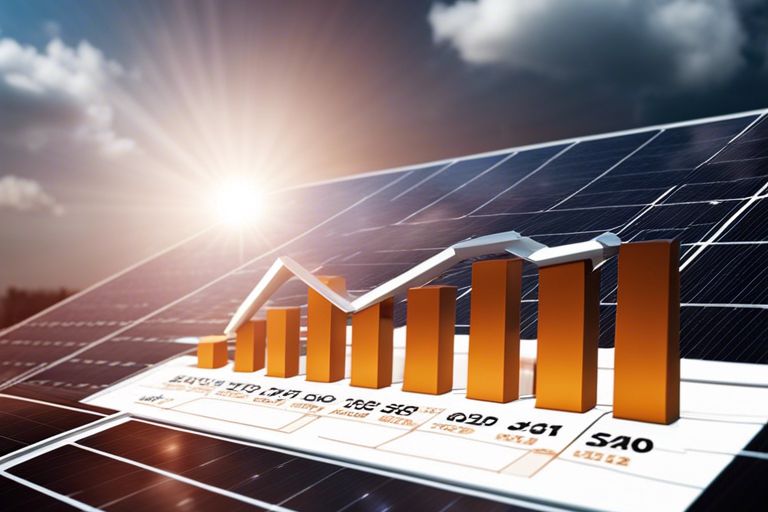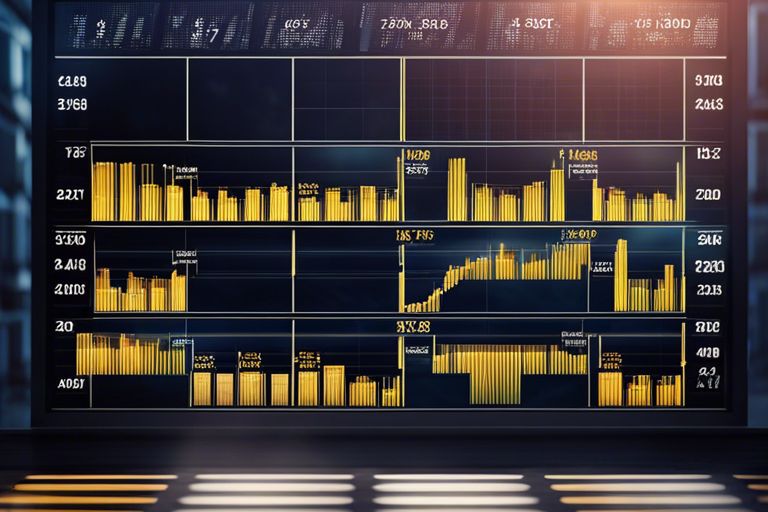Payback time on solar panels can vary based on numerous factors. From your initial investment to energy savings, the timeframe is influenced by your location, energy usage, incentives, and system size. Understanding these variables can help you calculate when your solar panels will break-even, making it a smart move in the long run. Let’s explore into the specifics to figure out how soon you’ll see returns on your sustainable investment.
Key Takeaways:
- Solar Panel Cost: The initial cost of solar panels and installation is a major factor in determining how long it will take for them to pay for themselves.
- Government Incentives: Taking advantage of government incentives and rebates can significantly reduce the time it takes for solar panels to pay for themselves.
- Energy Usage: The amount of energy your household consumes plays a role in determining the payback period for solar panels.
- Location: The amount of sunlight your location receives and local energy prices can affect how quickly solar panels will pay for themselves.
- Financing Options: Choosing the right financing option, such as a solar loan or lease, can impact the payback period of your solar panels.


The Benefits of Solar Panels
Reduced Energy Bills
For many homeowners, one of the most appealing benefits of installing solar panels is the significant reduction in energy bills. By harnessing the power of the sun to generate electricity for your home, you can decrease your reliance on the grid and lower your monthly utility expenses. Over time, this can lead to substantial savings, allowing you to recoup the initial investment made in installing solar panels.
Environmental Impact
One of the key benefits of solar panels is their positive environmental impact. By utilizing clean, renewable energy from the sun, you can reduce your carbon footprint and lessen the strain on finite resources. Solar panels produce electricity without emitting harmful greenhouse gases, making them a sustainable choice for environmentally conscious individuals.
Plus, by generating your own clean energy, you contribute to the overall shift towards a more sustainable energy future. This not only benefits you personally but also has far-reaching implications for the health of the planet as a whole.
Calculating the Payback Period
Factors Affecting Payback Period
Any number of factors can affect how long it will take for your solar panels to pay for themselves. The size of your system, the amount of sunlight your location receives, and the cost of electricity in your area all play a role. Additionally, government incentives, such as tax credits or rebates, can impact the payback period of your solar investment.
- Size of the solar system
- Amount of sunlight in your location
- Cost of electricity in your area
- Government incentives
After taking these factors into consideration, you can get a better estimate of how long it will take for your solar panels to pay for themselves.
Formula for Calculating Payback Period
Formula for determining the payback period involves dividing the total cost of your solar panel installation by your annual electricity savings. This formula can give you a rough estimate of how many years it will take for your solar panels to pay for themselves.
Average Payback Period for Solar Panels
Residential Solar Panels
Unlike commercial installations, residential solar panels typically have a shorter payback period. On average, it takes around 6-9 years for solar panels to pay for themselves on a residential property. This period may vary depending on factors such as the cost of electricity in your area, the amount of sunlight your location receives, and any available incentives or rebates.
When you invest in residential solar panels, you not only save money on your electricity bills but also increase the value of your home. Over time, the savings on your energy costs will offset the initial investment, making solar panels a cost-effective and environmentally friendly choice for your home.
Commercial Solar Panels
For commercial properties, the payback period for solar panels is typically longer than residential properties. On average, it can take anywhere from 7-12 years for commercial solar panels to pay for themselves. This longer period is often due to the larger upfront investment required for commercial-scale installations.
Commercial solar panels offer businesses the opportunity to significantly reduce their operating costs over the long term. In addition to saving money on electricity bills, businesses can take advantage of tax incentives and rebates that can further shorten the payback period for their solar panel system.
Factors Influencing Payback Period
Many factors can influence the payback period of your solar panels. Understanding these variables can help you better estimate how long it will take for your solar investment to pay off. Here are some key considerations to keep in mind when calculating your payback period:
- System Size and Quality: Any adjustments to your system size or the quality of the solar panels can directly impact your payback period. Investing in higher-quality panels may require a larger upfront cost but can result in greater energy production and shorter payback periods. It’s imperative to consider the long-term benefits of quality when making your initial investment. For more insights on this topic, check out the Solar Panel Payback Period (Guide).
- Local Incentives and Rebates: Influencing your payback period are various local incentives and rebates that can significantly reduce the upfront cost of installing solar panels. These incentives can vary depending on your location, so it’s crucial to research what programs are available in your area to maximize your savings.
Energy Consumption Patterns
Factors such as your energy consumption patterns can play a significant role in how quickly you see a return on your solar panel investment. The amount of energy your household uses, as well as the times of day when energy is consumed the most, can impact the efficiency of your solar panels.
Size, configuration, and orientation of your system are imperative considerations when assessing your energy consumption patterns. By optimizing your system to align with your energy needs, you can enhance the performance of your solar panels and shorten the payback period.

Real-World Examples
Not sure how long it will take for your solar panels to pay for themselves? You can find real-world examples and experiences from homeowners who have installed solar panels on Reddit’s TeslaSolar community. One popular discussion thread asks, “How many years does it take to break even on your solar panel investment?” This can give you a glimpse into different scenarios and timelines.
Residential Solar Panel Installation
On a residential scale, the time it takes for solar panels to pay for themselves can vary based on factors like your location, energy consumption, and available incentives. Some homeowners have reported breaking even on their solar panel investment in as little as 5-7 years, while others may take 10 years or more.
Commercial Solar Panel Installation
Any business considering commercial solar panel installation should evaluate the payback period carefully. Depending on the size of the installation, energy usage, and financing options, your commercial solar panels could pay for themselves in 5-10 years. Some businesses may even see a faster return on investment if they have high energy demands and can take advantage of tax incentives and rebates.
Understanding the financial aspects of commercial solar panel installations is crucial. In addition to the savings on electricity bills, businesses can benefit from tax incentives, rebates, and potentially sell excess energy back to the grid through net metering programs. By calculating your estimated savings and payback period, you can make an informed decision about investing in commercial solar panels for your business.
Maximizing Your Return on Investment
Optimizing System Performance
To maximize your return on investment with solar panels, it’s crucial to optimize the performance of your system. Ensure that your panels are installed in a location that receives ample sunlight throughout the day and is free from obstructions like shading from trees or buildings. Regular maintenance and cleaning of your solar panels will also help improve their efficiency and longevity.
Energy Efficiency Measures
Investing in energy efficiency measures in your home can further enhance the return on your investment in solar panels. By reducing your overall energy consumption through measures such as upgrading to energy-efficient appliances, improving insulation, and sealing drafty areas, you can lower your electricity bills even more. This means that your solar panels will not only pay for themselves faster but also continue to generate savings long after they have covered their initial cost.
Energy efficiency measures can include simple changes like switching to LED light bulbs or more significant upgrades such as installing a smart thermostat or upgrading to Energy Star-rated appliances. By combining these measures with your solar panel system, you can create a more sustainable and cost-effective energy solution for your home.
Conclusion
The decision to invest in solar panels is a significant one, as it involves both financial and environmental considerations. By assessing factors such as upfront costs, energy savings, and incentives available in your area, you can estimate how long it will take for your solar panels to pay for themselves. Bear in mind, the benefits of solar panels extend beyond financial gains – they also contribute to reducing your carbon footprint and promoting sustainability.
When considering the payback period for solar panels, keep in mind that the technology is constantly evolving, and prices are gradually decreasing. As you weigh the costs and benefits, think about the long-term advantages of producing clean energy and potentially reducing your reliance on traditional power sources. Making an informed decision about solar panels can lead to not only financial savings but also environmental benefits for you and future generations.
FAQ
Q: How long will it take for solar panels to pay for themselves?
A: The payback period for solar panels can vary depending on factors such as the cost of the system, your energy usage, available incentives, and location. On average, solar panels pay for themselves in 5 to 15 years.
Q: What factors can affect the payback period of solar panels?
A: Several factors can impact how quickly solar panels will pay for themselves, including the cost of the system, your energy consumption, the amount of sunlight your location receives, available incentives and rebates, and the financing options you choose.
Q: How can I shorten the payback period for my solar panels?
A: To shorten the payback period for your solar panels, you can consider options such as maximizing your energy efficiency to reduce your overall energy consumption, taking advantage of available incentives and rebates, choosing a financing option with low interest rates, and ensuring your solar panel system is properly sized and installed for optimal performance.
